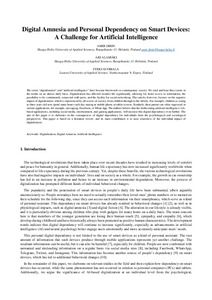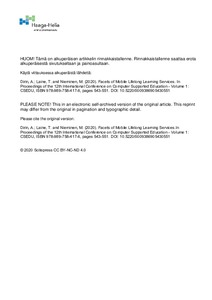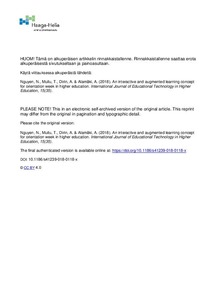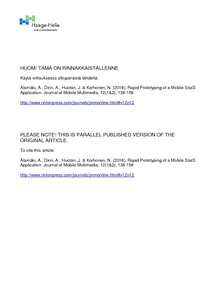"Dirin, Amir" - Selaus tekijän mukaan Julkaisut
-
AI-based Facial Recognition in Emotional Detections
Dirin, Amir; Suomala, Jyrki; Alamäki, Ari (Satakunnan ammattikorkeakoulu, 2019)Facial recognition is a method of identifying a human face with the help of computer vision (CV). The popularity of smart gadgets and the advancement of cameras’ capabilities have caused facial recognition to become a hot ... -
Analysing the implementation of two distinct pedagogical approaches in higher education institution
Dirin, Amir; Alamäki, Ari (International Academy of Technology, Education and Development, 2015)This paper aims to reveal the outcomes of two distinct mobile application concept design and development courses at Haaga-Helia University of Applied Sciences. These courses have applied dissimilar pedagogical approaches ... -
Assessments of User Centered Design Framework for M-learning Application Development
Dirin, Amir; Nieminen, Marko
Lecture Notes in Computer Science (Springer, 2015)This paper presents the evaluation criteria and process of the User Centered Design (UCD) framework for m-learning application development. Based on the proposed UCD framework we have designed and developed five mobile ... -
CASE STUDY: FROM REQUIREMENTS LIST TO AN EDUCATIONAL GAME
Dirin, Amir; Vainio, Ville (International Academy of Technology, Education and Development, 2015)This paper explores the development process of an educational mobile game from the customer’s initial requirements list to a functional multi-platform mobile game prototype. The game was targeted for students, lecturers ... -
Comparisons of Facial Recognition Algorithms Through a Case Study Application
Dirin, Amir; Delbiaggio, Nicolas; Kauttonen, Janne (Kassel Univ. Press, 2020)Computer visions and their applications have become important in contemporary life. Hence, researches on facial and object recognition have become increasingly important both from academicians and practitioners. Smart ... -
Digital Amnesia and Personal Dependency in Smart Devices: A Challenge for AI
Dirin, Amir; Alamäki, Ari; Suomala, Jyrki (Satakunta University of Applied Sciences, 2019)The terms “digitalization” and “artificial intelligence” have become buzzwords in contemporary society. We read and hear these terms in the media on an almost daily basis. Digitalization has affected modern life significantly, ... -
Digital Service Design for Service-Oriented Business Models
Alamäki, Ari; Dirin, Amir (Laurea ammattikorkeakoulu, 2015)Today, digital solutions are integral and strategic parts of most service-oriented organizations. Similarly, the ICT (information and communication technologies) sectors are also moving towards service-oriented business ... -
Embedding Virtual Objects Into the Physical World: Student-Centred Augmented Reality Concept Design and Development
Alamäki, Ari; Dirin, Amir
Techne series : 2 (Oslo and Akershus University College, Learning Centre and Library, 2021)In the contemporary world where almost, everything has moved towards digitalisation, the combination of virtual and physical worlds has proved to be an efficient approach in an educational context. Since the application ... -
Facets of Mobile Lifelong Learning Services
Dirin, Amir; Laine, Teemu; Nieminen, Marko (SCITEPRESS Science And Technology Publications, 2020)In the era of digital services and digital connectivity, a massive amount of knowledge has become available and accessible all the time and for all ages. This mandates significant structural changes in the ways in which ... -
Gender Differences in Perceptions of Conventional Video, Virtual Reality and Augmented Reality
Dirin, Amir; Alamäki, Ari; Suomala, Jyrki (Kassel University Press, 2019)The user’s emotional involvement plays an important role in adopting new technologies. The level of engagement with and adoption of new digital applications depends on various personal, contextual, and emotional factors. ... -
An interactive and augmented learning concept for orientation week in higher education
Nguyen, Nguyen; Muilu, Tuomo; Dirin, Amir; Alamäki, Ari (Springer, 2018)This paper details the concept development process for an interactive and augmented reality based application that compensates for attending Orientation Week at a higher education institution. The application will help ... -
Managing Emotional Requirements in a Context-Aware Mobile Application for Tourists
Dirin, Amir; Laine, Teemu; Alamäki, Ari (Kassel University Press, 2018)The objective of this study was to unveil the importance of emotions and feelings in developing mobile-based tourism applications. We gathered and analyzed emotional requirements to develop a mobile context-aware application ... -
mLUX: Usability and User Experience Development Framework for M-Learning
Dirin, Amir; Nieminen, Marko (Kassel University Press, 2015)In this paper, we propose the mLUX framework, a model based on the user-centered design (UCD) framework, which is specifically for the development of m-learning applications. We present the results of four case studies ... -
MOBILE LEARNING CONCEPT FOR PARENTING
Sharma, Chandni; Dirin, Amir; Mostakhdemin-Hosseini, Behrooz (International Academy of Technology, Education and Development, 2017)Communication has become easy in terms of texting, calling, video calling, and social networks through smart devices. Smartphones have become the solution to most problems of everyday life and information searching has ... -
Quality Practitioners’ Differing Perspectives on Future Software Quality Assurance Practices
Lagstedt, Altti; Dirin, Amir; Williams, Päivi (Kassel Univ. Press, 2021)Constant changes in a business context and software development make it important to understand how software quality assurance (SQA) should respond. Examining SQA from supplier and client perspectives, this study explores ... -
Rapid Prototyping of a Mobile SaaS Application
Alamäki, Ari; Dirin, Amir; Huotari, Jouni; Korhonen, Niko (Rinton Press, 2016)Rapidly developing a customizable mobile application and the related software as a service (SaaS) is challenging and rarely studied. Traditionally, SaaS solutions are mainly accessed using personal computers, but the mobile ... -
Science Spots AR: a platform for science learning games with augmented reality
Laine, Teemu; Nygren, Eeva; Dirin, Amir; Suk, Hae-Jung (Springer, 2016)Lack of motivation and of real-world relevance have been identified as reasons for low interest in science among children. Gamification and storytelling are prominent methods for generating intrinsic motivation in learning. ... -
Social Media and Social Bonding in Students' Decision-Making Regarding Their Study Path
Dirin, Amir; Nieminen, Marko; Alamäki, Ari
International Journal of Information and Communication Technology Education : 1 (IGI Global, 2021)Students are often unsure of how to select the right study path at a higher educational institution. They either lack knowledge of a proposed study path or they do not manage to learn more before making their selection. ... -
The Stakeholders of a User-Centred Design Process in Mobile Service Development
Alamäki, Ari; Dirin, Amir (The Society of Digital Information and Wireless Communications, 2015)The use of agile methods in mobile service development has gained much attention in software design research. In addition, involving the potential stakeholders of the mobile service in the design and development process ... -
Students' expectations and social media sharing in adopting augmented reality
Alamäki, Ari; Dirin, Amir; Suomala, Jyrki
The international journal of information and learning technology : 6.1.2021 (Emerald Group Publishing Limited, 2021)Purpose: This study examines students’ emotional responses to augmented reality (AR) applications and their willingness to share on social media. It also compares user experiences of AR and virtual reality (VR). Design: ...



















